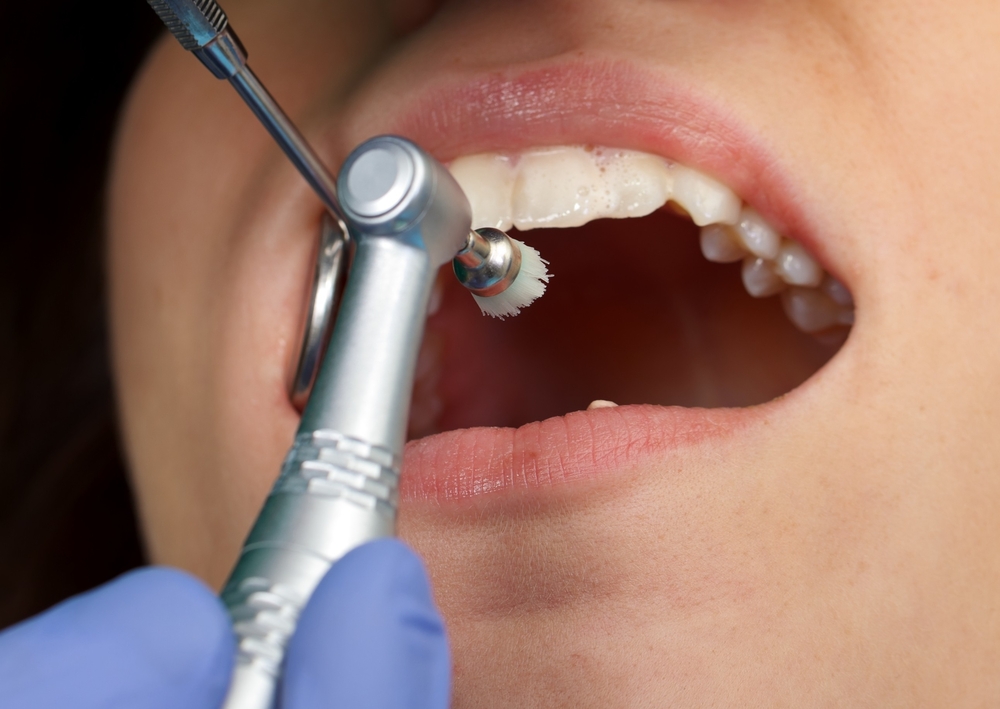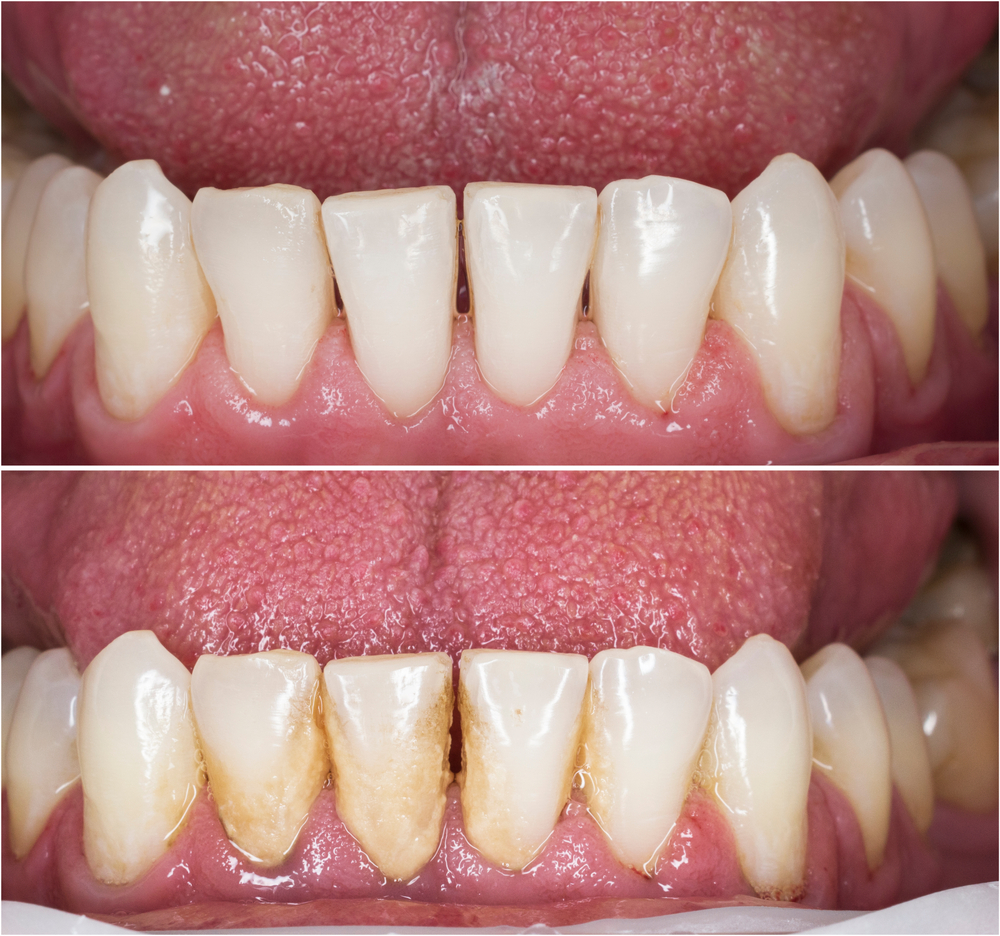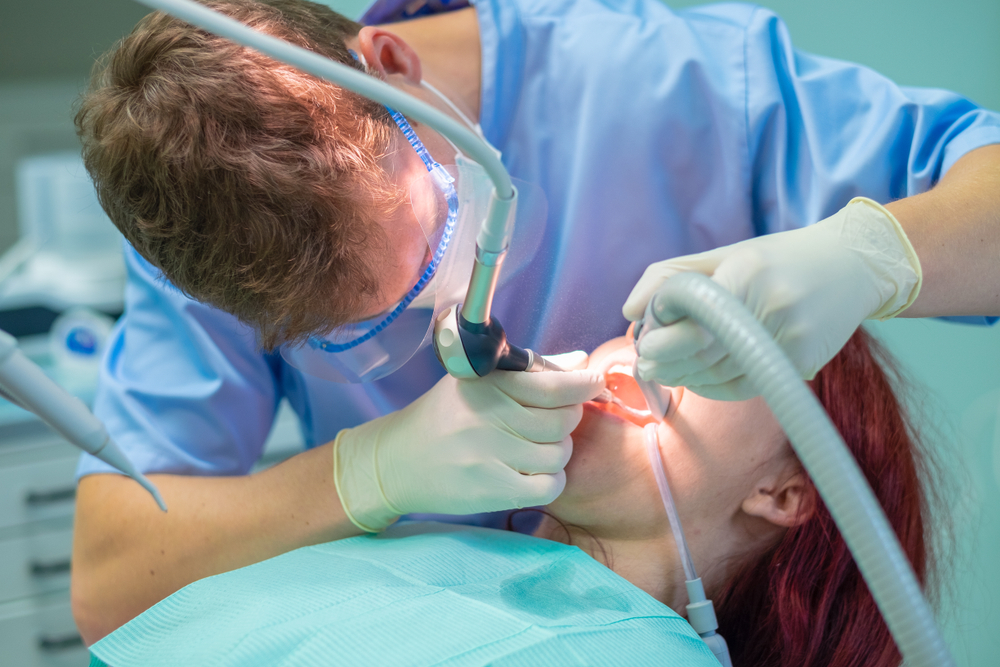What is a scale and polish, and why do you need one? If you want to prevent gum disease, you’ll need to address the problems of plaque and poor oral hygiene. Brushing twice a day and flossing regularly go a long way towards good oral health. It’s important to prevent plaque from accumulating around the gum line. Good brushing and flossing techniques can prevent bacteria from multiplying. Once plaque has developed, it hardens into calculus, commonly known as tartar, which can be impossible to remove yourself.
If left unchecked, this can lead to advanced gum disease, which can cause bone and tooth loss. In some cases, you may require emergency dentist intervention or specialist dental treatment. In the worst-case scenario, you may even need to consider a root canal and restorative treatments like dental crowns. The good news is that a dentist or dental hygienist has all the right tools to help you say goodbye to plaque and tartar for good and will help teach you the correct techniques used for a good oral hygiene routine.
What is a Scale and Polish Treatment?

The first step is to book a check-up appointment with a dentist in Cork. Your teeth, oral hygiene, and medical history will be assessed before any treatment is carried out. Your dentist will use a probe to check the health of your gums, looking for any signs of inflammation and bleeding. They will check for any signs of plaque deposits that might have formed beneath the gum line. This process is important as it will identify any underlying gum disease, which should be treated with a detailed hygiene visit, but in some cases, deep cleanings are required.
When you’re ready for your scale and polish, your dentist will use an ultrasonic scaler to start the treatment. This device uses high-frequency vibrations and water to remove plaque deposits from the teeth. It will also remove enamel stains. Sometimes, manual scaling is required to remove particularly stubborn plaque deposits. Once your checkup and full mouth exam are complete, you will then attend the dental hygienist for a full mouth cleaning and oral hygiene instruction. The dentist and hygienist liaise together, and you will be advised on what’s best for your overall oral health.
Once scaling is finished, polishing gets underway. Your hygienist will apply a polishing paste to your teeth with a motorised rubber tool, or in some cases, we will use an air polisher. This will remove any significant stains while leaving the surface of your teeth feeling smoother than before. Once the treatment has been completed, you’ll be advised on the best brushing techniques to keep your teeth looking their best. You might be advised to book in for further polish and scale treatments or schedule an appointment with a dental hygienist.
What is a scale and polish going to do for you in the long term? While every patient enjoys the feeling of cleaner teeth and fresher breath, this procedure leads to better oral hygiene and reduces the risk of bone and tooth loss. Using a good fluoride toothpaste and daily flossing can help safeguard you against further issues before visiting your hygienist for your next scale and polish
How Long Do Scale and Polish Take?
This all depends on how long it’s been since your last visit. If you’ve not had a scale and polish for several years, 2–4 visits might be required to remove those plaque and tartar deposits. However, if you regularly visit the dentist and practise good oral hygiene, a scale and polish can take as little as 20 to 30 minutes.
Does a Scale and Polish Whiten Your Teeth?
Looking to improve the appearance of your pearly whites? Although a scale and polish aren’t primarily intended to whiten teeth, you will notice markedly brighter teeth after the process. What is a scale and polish going to do that teeth whitening won’t? While teeth whitening is a purely cosmetic procedure, scaling gets to the root of the problem. Once all that plaque and tartar are removed, your teeth will not only look better, but they’ll also feel noticeably cleaner and smoother.
How Often Should You Get a Scale and Polish?
Scale and polish treatments are designed to manage the effects of gum disease, although they’re also a good preventative measure to keep plaque at bay. Ideally, you should be booking a scale and polish with your hygienist every three to six months, but every person is different, so chat with your hygienist and get their advice on how many visits are recommended. However, some people should consider investing in a procedure more regularly. If you’re a smoker or regularly consume sugary drinks, coffee, and alcohol, you’ll almost certainly experience more plaque buildup than the average person. Other risk factors include diabetes, underlying medical conditions, and some medications. Diabetics tend to suffer from dry mouth, and dental plaque tends to build up more easily, even when good oral hygiene is practiced. It’s important to disclose all medical conditions so your dentist and hygienist can make the best plan for your long-term oral hygiene health.
Is a Scale and Polish Painful?
For most people, a scale and polish won’t hurt. However, the treatment can feel a little sensitive, especially if you’ve never had a scale and polish before. Generally speaking, it’s completely painless; however, you may notice more discomfort if you have existing gum disease, receding gums, enamel wear, or decay. If you have sensitive teeth normally, you may experience minor discomfort while the procedure is being performed.
However, you may notice more discomfort if you have an existing gum disease. If you have worn teeth, you may experience minor pain while the procedure is being performed.
Are you someone who’s sworn off the scale and polish treatment due to a previous bad experience? At Bandon Dental, our experienced and professional team is on hand to show you how gentle the process can be. For most patients, the experience is painless.
If you have particularly sensitive teeth, it’s worth asking about local anaesthetics or the use of numbing gels, which are also effective at making the procedure more bearable. It’s very common to use local anesthetics, so always ask. We aim to make your experience as comfortable as possible.
Once a scale and polish have been completed, it’s perfectly normal to experience some minor sensitivity to hot and cold or when brushing. You may also notice tender gums and a small amount of bleeding. However, this usually clears up within a day or two.
How Much is a Scale and Polish?
What is a scale and polish going to cost you? At Bandon Dental, our treatments start at €15.
Is a Scale and Polish Covered by PRSI?
Yes, you may be able to subsidise the cost of a scale and polish if you pay PRSI. However, to qualify, you’ll need to have paid social insurance contributions in the past. Eligibility criteria vary, depending on your age. Insured employees, self-employed workers, and retired people are all eligible for dental benefits if they’ve made sufficient PRSI contributions. Some patients don’t need to have paid PRSI contributions themselves, but they’ll need to be classified as dependents and live with a partner or spouse who does qualify.
If you qualify for PRSI, you’ll be able to pay for an annual scale and polish for €15. However, you will be advised to arrange for a second appointment in any given year privately to ensure plaque is removed and gum disease is kept at bay.
Before and After

Looking for Scale and Polish Dentist in Bandon?
Tired of staring at unsightly tartar on your teeth? Struggling with inflamed gums or bad breath? You’re probably overdue for a scale and polish. At Bandon Dental, our team is on hand to help. Once you’ve booked your initial consultation with one of our dentists, they will talk you through the current condition of your teeth and gums, and then one of our dental hygienists will clean, polish, and go through oral hygiene.
What’s more, we provide a full suite of dental treatments and are certified by the IDA. Whether you’re looking for composite bonding, or restorative treatments like crowns, or want to talk more about orthodontics and Invisalign, we’ll be happy to discuss options with you. Use the online contact form to send us a query today, or give us a call at (023) 884 1752.

